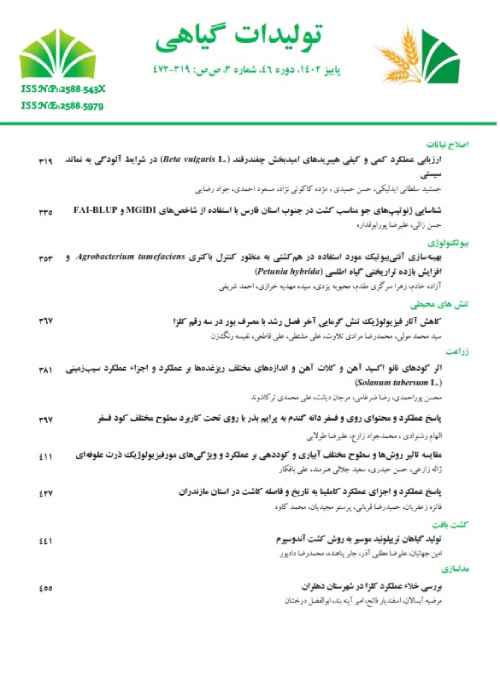Effect of drought stress on photosynthetic parameters, yield and yield components of tropical alfalfa genotypes
Water resources limitation and plant stress due to water shortage is one of the important and common environmental stresses in agricultural production, including forage production in hot and dry areas. Therefore, the selection and development of drought-tolerant cultivars are very important. In irrigated lands of Iran, the average of irrigation efficiency is 37% and water productivity is 0.8 kg per cubic meters, which is lower than the world average. For increasing water efficiency, maintaining the production capacity and creating sustainable agriculture, it is necessary to identify the effective factors on the reduction of irrigation water productivity and provide an appropriate solution. In arid regions such as Khuzestan province, by using both a proper irrigation program and irrigation levels below the water requirement, obtaining the acceptable yield of alfalfa could be expected. In order to achieve these objectives, determination of the irrigation water productivity of tropical alfalfa cultivars and their drought tolerance under different irrigation regimes were the main aims of this study.
For evaluating tropical alfalfa genotypes under different drought stresses, an experiment was carried out based on split plots design with three replications in Safiabad Agricultural Research Center, Dezful, Iran, in 2019-2020. The main factor was four levels of irrigation (25, 50, 75 and 100% of water requirement) and the second factor was five alfalfa cultivars (Baghdadi, Nikshahri, Yazdi, Mesasirsa, and Omid). In this experiments, plant characteristics including dry and wet forage yield, percentage of dry forage, leaf to stem weight ratio, chlorophyll index (SPAD), electrolyte leakage from the leaf cell membrane (EL), relative leaf water content (RWC), and Maximum quantum yield in the dark-adapted conditions (ΦPSɪɪ) were determined.
The results showed that by applying drought stress, wet and dry forage yields, RWC, and ΦPSɪɪ were decreased but the percentage of dry forage, leaf to stem weight ratio, EL, and SPAD were increased. Among the studied genotypes, the Baghdadi genotype had the highest dry forage yield in all situations; non-stress conditions (16.9 t/ha), mild drought stress (15.094 t/ha), moderate drought stress (9.58 t/ha) and severe drought stress (4.664 t/ha). The Yazdi genotype had the lowest dry forage yield; 9.9, 9.7, 5.7 and 3.6 t/ha for non-stress, mild, moderate, and severe drought stresses conditions, respectively.
In our experiment, the Baghdadi genotype showed a high-stress tolerance index (STI) and we highly recommend planting it in the north of Khuzestan province, but the Yazdi alfalfa genotype despite low dry forage yield under both non-stress and drought stress conditions is not recommended due to low production. We suggest using Yazdi genotype in eugenic plans due to high yield stability index (YSI) under drought stress conditions and having some favorable physiological and photosynthetic parameters associated with drought stress tolerance.
- حق عضویت دریافتی صرف حمایت از نشریات عضو و نگهداری، تکمیل و توسعه مگیران میشود.
- پرداخت حق اشتراک و دانلود مقالات اجازه بازنشر آن در سایر رسانههای چاپی و دیجیتال را به کاربر نمیدهد.



